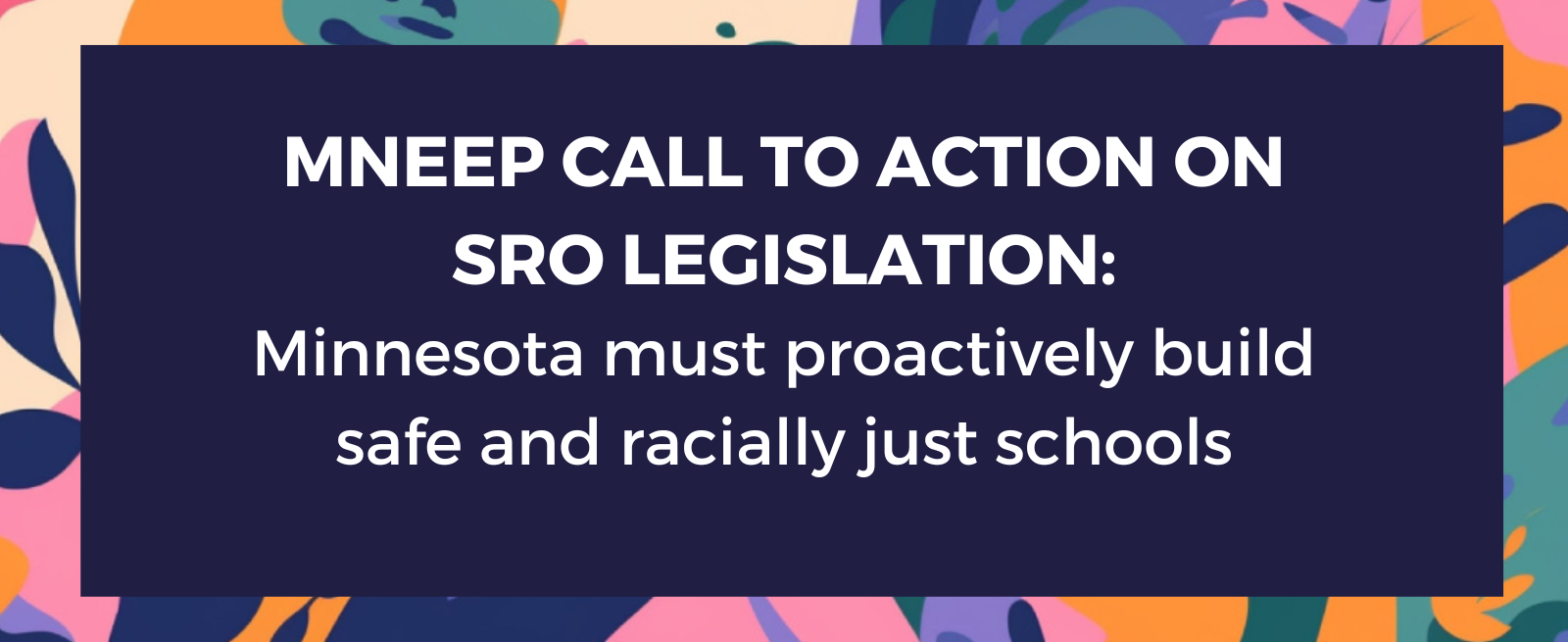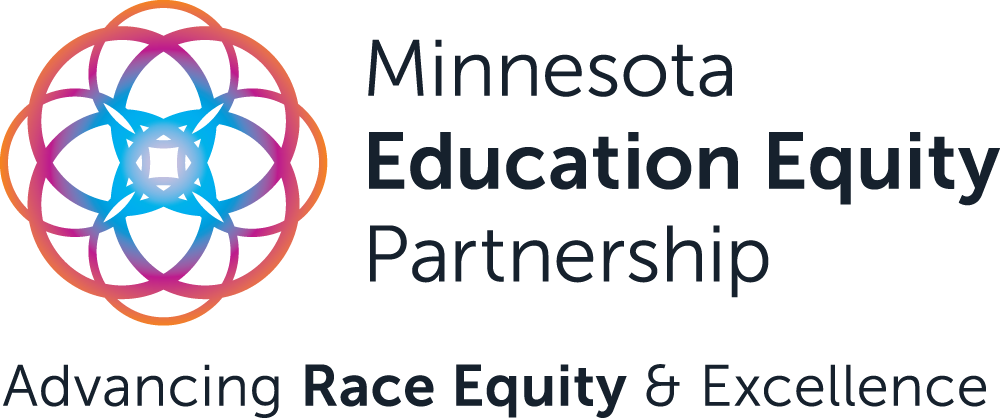
MnEEP Call to Action on SRO Legislation
Minnesota must proactively build safe and racially just schools
As the Minnesota Legislature prepares to take action to clarify and strengthen the existing legislation regarding the use of force by School Resource Officers (SROs) within our E-12 schools, we find ourselves at a pivotal moment in our state’s history to reaffirm our commitment to schools that nurture the development of young people to peacefully resolve conflict and build strong communities.
Minnesota has long stood against corporal punishment in schools, banning through clear policy any use of physical force that could harm students physically or emotionally.
Last year, the state refined its stance through amendments in 2023 to MN Stat. § 121A.58, setting stricter boundaries on physical restraints. These amendments specifically prohibit school agents, including employees, contractors, SROs, and contracted police officers, from using prone restraints or any holds that might restrict a student’s breathing or communication of distress.
A Renewed Opportunity for Dialogue and Action
This new legislation banning prone restraints of students sparked both strong support and objections. Support in particular came from communities of color who have long been concerned with the racially disparate ways that their students have been harmed by such practices. Objections came from law enforcement officers, concerned that the new law overreached into their preference to have broad discretion in managing safety in schools. This required Minnesota Attorney General Keith Ellison to call for further legislative clarity after finding that officers still maintained discretion on use of force.
This response has also presented a renewed opportunity to center diverse voices aimed at developing strategies to ensure safe school environments will not only foster academic advancement of our culturally and racially diverse students, but also affirm and honor their human dignity.
Amidst diverse viewpoints, the path to consensus on public policy can be complex. However, Minnesota Education Equity Partnership (MnEEP) is committed to nurturing constructive dialogue and broad-based support for policies that champion racial equity and supportive, safe schools for all students.
It is in that spirit, we aim to equip our leaders with the tools they need to advance racial equity in school safety and school climate in this next legislative session.
Our Legislative Priorities for Safe and Racially Equitable School Climates
MnEEP emphasizes the critical need to embed these foundational values in drafting new school climate legislation.
Center Anti-Racism and Racial Equity: At the heart of all legislative education efforts must be a commitment to racial equity, ensuring initiatives to dismantle systemic racism are robust, well-supported, and ingrained in educational policies and practices that support academic excellence..
Guarantee Safety from Racial Harm: A fundamental right of all students and educators is protection from racial harm. Legislation should establish comprehensive safeguards against racial discrimination and violence, promising a safe, secure environment conducive to learning and personal development.
Foster Dignified Relationships: Legislation should also emphasize the development of respectful and dignified relationships and interactions within schools—particularly, security professionals and students of color and Indigenous students—promoting a culture of safety, trust, and inclusivity.
Promote Positive Contributions: Encouraging students to positively impact their school culture should be reflected in legislation that prioritizes restorative practices, fostering an environment where students are empowered to resolve conflicts constructively. State resources should be appropriated to support this.
Define the Proper Role of Security Professionals: School security should act as a supportive presence for all students, upholding safe and inclusive school environments, instead of acting as discipline authority or enacting punitive measures.
Decouple School Discipline from Criminal Justice: School discipline must be addressed within the educational context, focusing on restorative rather than punitive practices, to prevent the overcriminalization of young people that continues to cause racial harm and exacerbate racial disparities.
These priorities transcend mere aspirations; they are essential standards for any policy aiming to enhance school climates while advancing learning and racial equity.
Our advocacy is for a future where these principles are not just ideals but the foundation of every school’s ethos, guaranteeing that racial equity is not an exception, but a universal reality.
Our Legislative Call to Action
While MnEEP acknowledges there might be school safety incidents that require a physical response by SROs, we support a ban on the use of prone restraints in schools by SROs, security personnel, and any and all district agents.
The use of prone restraints does not align with our mission and values to promote safe, racially equitable schools and advance racial equity and educational excellence.
It’s imperative that Minnesota policymakers use this critical opportunity to ensure the human and Constitutional rights of students are protected in all school safety policies.
This means taking decisive and swift action to enact laws that:
- Standardize SRO Practices: Introduce uniform standards for the practices of SROs across the state, especially in terms of use of force, to guarantee consistent and equitable treatment throughout Minnesota.
- Establish Clear Reporting and Accountability: Create detailed reporting protocols for incidents involving SROs, aiming to improve transparency and accountability.
- Implement State Licensure Regulations of SRO conduct, especially regarding the use of force, to ensure sustained compliance with standards.
A Path Forward, Together
Prior to recent updates to SRO policies, Minnesota’s state laws already underscored the necessity of clearly defining the conditions under which force could be utilized in educational environments. The use of police in schools has gained further scrutiny as studies have shown a significant link between the presence of law enforcement in schools and a greater likelihood of young students being funneled into the criminal justice system.
This growing concern has been a catalyst for the latest call for legislative action, aligning with the Minnesota legislature’s current commitment to redress racial inequities. In tandem, there has been a concerted effort among schools and policymakers to foster school climates where responses to student infractions are not dependent on use of force.
The Minnesota Department of Education’s training division plays a crucial role in these efforts, supporting schools in the development and application of disciplinary policies designed to build positive school climates and redress racial harm.
Such initiatives are reflective of a broader, evolving commitment to implement robust policies and practices that support the well-being and ambitions of all students, while actively working to dismantle systemic racial injustices.
Moreover, they highlight the inadequacy of solely depending on law enforcement as the primary strategy for ensuring school safety, as doing so not only perpetuates racial harm but also detracts from the essential leadership required to cultivate educational spaces that are both nurturing and empowering.
We urge the Minnesota Legislature to persist in its journey towards racial justice, leveraging this crucial moment to prioritize a diversity of voices and perspectives, all united with the shared goal of achieving safe, and racially equitable schools.
Now, more than ever, it’s imperative to establish explicit and racially equitable guidelines and accountability standards for School Resource Officers (SROs) to guarantee that our schools are always safe, affirming, and supportive environments for every student.

